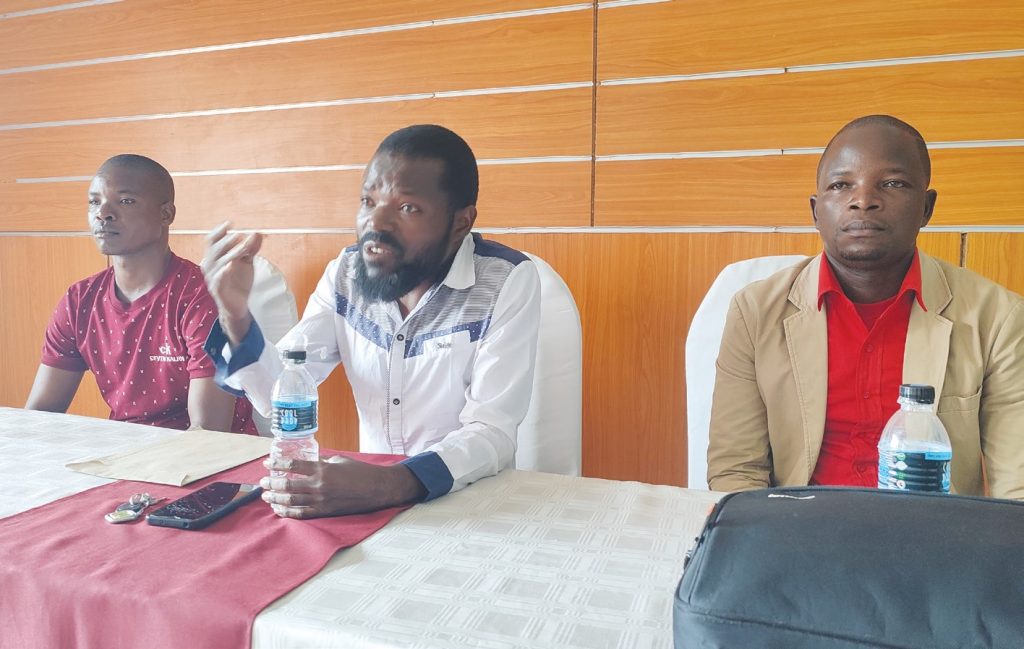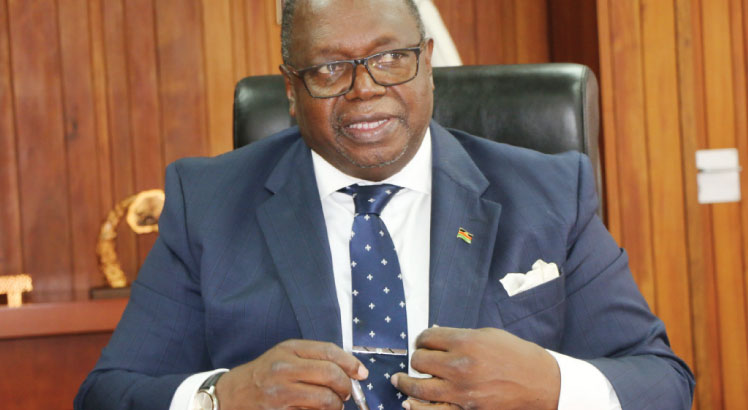Recently gazetted minimum wages have drawn the wrath of Lilongwe Shops and Domestic Workers Association which feels they are a mockery and has asked government to revise them upwards to guard against exploitation.
The reaction comes after Ministry of Labour last month set K52 000, up from K38 000 per month, as the minimum wage for domestic workers while for those in formal employment such as shop workers it went up to K90 000 from K50 000.
Rahman (C) speaks during the briefing on Monday
But briefing the media in Lilongwe on Monday, the association’s chairperson Jaffar Albdu Rahman asked government to factor in the wages the recent devaluation of the kwacha and the rise in cost of living.
He said house rentals have gone up as have food prices and transport fares.
Said Rahman: “Employers will comply with what government will set. Already, employers in Lilongwe had agreed to have minimum pay for domestic workers at K80 000 and those working in shops at K120 000, but changed tune after government came up with the new minimum wages.
“Government should consider adopting what the Lilongwe employers and workers had agreed.”
He also urged government to be the first to promote the welfare of its citizens and not expose them to exploitation, arguing employers have the tendency to align the workers’ pay to the minimum wage.
Rahman also accused Malawi Congress of Trade Unions (MCTU) of betraying domestic workers and shop workers by agreeing to what he called exploitative minimum wages, adding that the domestic workers and shop workers were not consulted.
“Unless we can be told that the K52 000 is just an allowance or bonus or government should tell us that we are slaves and government is promoting that we should be enslaved in our own country,” he said.
The association has since warned that if government does not revise the minimum wages, the workers will go on strike and ensure that shops across the country do not operate.
But in an interview on Monday, Ministry of Labour spokesperson Nellie Kapatuka said government came up with the minimum wages after consulting with both the Employers Consultative Association of Malawi (Ecama) and MCTU.
She said: “Representatives of employers and employees were engaged. Unfortunately this association does not belong to Malawi Congress of Trade Unions.
“They should understand that a number of things are looked into when coming up with the minimum wage. You look at the economic environment.”
Kapatuka called on the Lilongwe Shops and Domestic Workers Association to negotiate with their employers to pay them what they agreed.
MCTU president Charles Kumchenga said the trade unions mother body was yet to get any communication or complaint from shop and domestic workers protesting the current minimum wage.
He said MCTU was not aware of any agreement that the employers had made with the Lilongwe Shops and Domestic Workers Association to set minimum wage at K80 000 for domestic workers and K120 000 for those that work in shops.
Said Kumchenga: “I cannot comment much on the agreement as we haven’t seen the document. We need to see the agreement and what was agreed, but also check who really are protesting the minimum wages.”
He said if the Lilongwe Shops and Domestic Workers Association and their employers agreed on specific minimum rates, it will not be right for the employer to reduce the amounts just because government has set the minimum wage below what they agreed.
In May last year, MCTU held a Tripartite Labour Advisory Council Meeting in Lilongwe where, among other issues, it recommended to government to revise the minimum wage from the current K50 000 to K100 000, representing a 100 percent increase to cushion workers against the prevailing economic hardship.
However, before the minimum wage hike proposal was reviewed, the Reserve Bank of Malawi announced a 44 percent devaluation of the kwacha, a development that saw the exchange rate adjusted from K1 180.29 to K1 700 against the United States dollar in authorised dealer banks amid rising inflation.
Soon after the devaluation, MCTU, which promotes workers’ rights, proposed a 44 percent minimum revision of salaries for workers to cushion them against effects of the devaluation of the kwacha.
The post Minimum wage sparks protest first appeared on The Nation Online.
The post Minimum wage sparks protest appeared first on The Nation Online.
 Moni Malawi
Moni Malawi 

